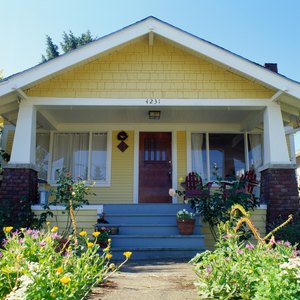
One of the first decisions homebuyers make is the type of home they want and need. When you purchase a single-family home, you are purchasing the land it sits on and anything permanently affixed to that land, such as buildings and trees. Ownership of a condominium unit or the rental of an apartment, on the other hand, gives you the exclusive right only to the interior space of the unit. The common areas -- such as the pool, the grounds and other facilities -- are open to use by anyone in the community. While there is something to be said for condo and apartment living, single-family homes have their virtues, too.
Money Issues
Unless you purchase a condo or townhouse in an upscale development, single-family homes typically have a higher resale value. Single-family dwellings generally cost more to maintain than attached homes and lack the cost-sharing features that a homeowners association provides, such as the reserve fund that pays for roof and pool repairs. As a tenant, you’ll typically pay more to rent a house than you will an apartment or condo.
Room to Move
Roominess is more common in detached homes -- both inside and outside. Homeowners and tenants have more furniture choices, storage space and room for entertaining. Attached homes, although they may have a bit of a yard, lack the large parcels of land beneath some single-family homes. If you like to work in the yard or require garage space for your hobbies or storage, a single-family home has the advantage.
Labor Intensive
One of the biggest disadvantages of owning a home, whether single- or multi-family, is the maintenance required to protect your investment. Single-family homes cost significantly more to maintain. When small repairs aren’t made in a timely fashion, systems wear down even more, and the homeowner ends up with a condition known as “deferred maintenance,” which can negatively impact the home’s value. While deferred maintenance can happen in all homes, owning a condo or other home with a homeowners association offers some protection from high maintenance bills. Roof repairs and maintenance of shared walls and plumbing are covered by the combined fees collected by the HOA. If you are someone who lacks the DIY gene or tends to procrastinate until small repairs blossom into disasters, buying a condo or renting an apartment may be the right choice for you.
The Goodies
Not all condo complexes offer amenities, but those that do have a leg up on a single-family home. Many condo communities offer security options not found in houses, such as doormen, keyed entries and roving security patrols. Depending on the price of the units within the condo community, you may also find pools, tennis courts, gym facilities and even on-site retailers and eateries. Single-family homes may offer their own set of amenities such as media rooms and larger, more private outdoor areas.
Freedom
While some housing developments are governed by HOAs, these associations are more prevalent in condo and townhouse complexes. HOA rules for what can and can’t be done to a home can be stringent, virtually crippling the homeowner’s ability to express originality. Single-family homeowners, on the other hand, can let their imaginations run wild. The neighbors may not like it, but if you want to paint your home fuchsia, you can. If you want to park your boat in the driveway, you can. While this is an advantage to living in a single-family home, it can also be a disadvantage if you are forced to look at your neighbor’s fifth wheel parked in front of his house.
References
Writer Bio
Based in the American Southwest, Bridget Kelly has been writing about gardening and real estate since 2005. Her articles have appeared at Trulia.com, SFGate.com, GardenGuides.com, RE/MAX.com, MarketLeader.com, RealEstate.com, USAToday.com and in "Chicago Agent" magazine, to name a few. She holds a Bachelor of Arts in English with a concentration in creative writing.

